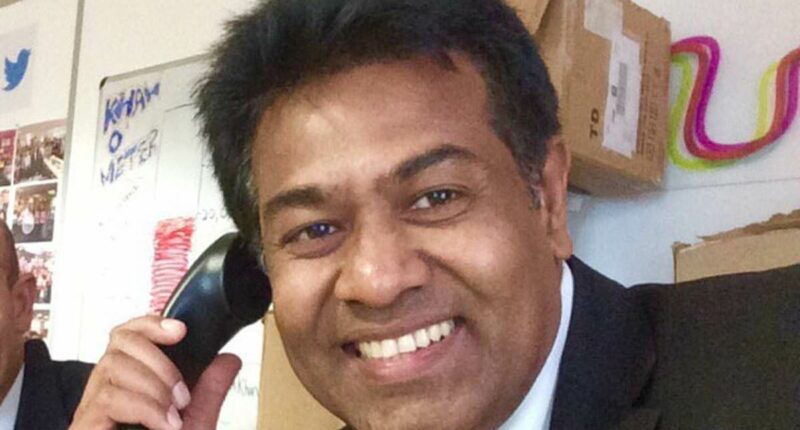Share this @internewscast.com
An immigration barrister has come under scrutiny for allegedly utilizing Artificial Intelligence to craft submissions in an asylum case. The tribunal heard that Chowdhury Rahman reportedly relied on software, including ChatGPT, for his legal research.
During the presentation of his submissions, the seasoned barrister left the judge perplexed by citing cases that were described as either “entirely fictitious” or “wholly irrelevant.” This reliance on AI-generated content has sparked questions about the integrity of his legal work.
It was revealed that Mr. Rahman not only used AI to prepare his submissions but also neglected to conduct thorough checks to verify their accuracy. This oversight has raised concerns about the due diligence required in legal proceedings.
Upper Tribunal Judge Mark Blundell noted that Mr. Rahman attempted to conceal his use of AI from the tribunal, which resulted in a “waste” of the court’s time. Such actions underscore the potential pitfalls of uncritical reliance on AI in professional settings.
In light of these findings, Judge Blundell is contemplating whether to report Mr. Rahman to the Bar Standards Board, highlighting the potential professional consequences for the barrister.
Judge Blundell said he is now considering reporting Mr Rahman to the Bar Standards Board.

Chowdhury Rahman was caught using software such as ChatGPT to prepare his legal research, a tribunal heard.

Chowdhury Rahman with Mayor of London Sadiq Khan in pictures posted on social media
The matter came to light in the case of two Honduran sisters who claimed asylum on the basis they were being ‘targeted’ by a notorious criminal gang in their home country.
Mr Rahman represented the sisters, aged 29 and 35.
The sisters claimed asylum on the basis of international protection, alleging they were being ‘targeted’ by a powerful gang named Mara Salvatrucha (MS-13).
The tribunal heard the pair arrived to the UK by air in June 2022 and claimed asylum on arrival at Heathrow airport.
In screening interviews, they said the criminal gang wanted them to be ‘their women’ and had threatened to kill the sisters and their families if they did not accede to the request.
In November 2023, the Home Office refused their application for asylum, saying it did not accept the two women had ‘genuinely been targeted by the gang’.
The sisters appealed the matter to the first-tier tribunal but the application was dismissed by a judge, who said the sisters had not demonstrated how they were ‘the subject of adverse attention in the hands of a gang whilst in Honduras’.
The case was then appealed to the Upper Tribunal.
Mr Rahman, acting for the sisters, said the judge had failed to adequately assess credibility, made an error of law when looking at the documentary evidence, and failed to consider risk under Article 3 of the ECHR, which prohibits torture.
The barrister also raised issues on procedural fairness and said the judge failed to consider the impacts of internal relocation.
But, these claims were rejected by Judge Blundell who said that ‘nothing said by Mr Rahman orally or in writing establishes an error of law on the part of the judge and the appeal must be dismissed’.
Then, in a rare step, Judge Blundell went on to say in a postscript there were ‘significant problems’ within the grounds of appeal which were put before him.
He said twelve authorities were cited in the paperwork by Mr Rahman, but when he came to read the grounds, he noticed that ‘some of those authorities did not exist and that others did not support the propositions of law for which they were cited in the grounds’.

Chowdhury Rahman with former Labour leader Jeremy Corbyn in a picture posted on social media
In his judgement, he listed 10 of these cases and set out ‘what was said by Mr Rahman about those actual or fictitious cases’.
Judge Blundell said: ‘Mr Rahman appeared to know nothing about any of the authorities he had cited in the grounds of appeal he had supposedly settled in July this year.
‘He had apparently not intended to take me to any of those decisions in his submissions.
‘Some of the decisions did not exist. Not one decision supported the proposition of law set out in the grounds.’
Judge Blundell said the submissions made by Mr Rahman – who said he had used ‘various websites’ to conduct his research – were therefore ‘misleading’.
Judge Blundell said: ‘The most obvious explanation is… that the grounds of appeal were drafted in whole or in part by generative Artificial Intelligence such as ChatpGPT.
‘I am bound to observe that one of the cases cited in Mr Rahman’s grounds… has recently been wrongly deployed by ChatGPT in support of similar arguments…’
Mr Rahman told the judge the inaccuracies in the grounds were ‘as a result of his drafting style’ and accepted that there might have been some ‘confusion and vagueness’ in his submissions.
He said that he might ‘need to construct sentences in a more liberal way’ and that his drafting should perhaps ‘be a little more generous’ when it came to making specific allegations about judges overlooking or failing to follow binding caselaw.
Jugde Blundell said: ‘The problems which I have detailed above are not matters of drafting style.
‘The authorities which were cited in the grounds either did not exist or did not support the grounds of which were advanced.
‘Where the cases did exist, they were often wholly irrelevant to the proposition of law which was given in the grounds.
‘My other serious concern was that Mr Rahman did not appear to understand the gravity of the situation.
‘He said that he might need further training on legal research and he said that he would try to draft in a more ‘liberal way’ in the future, but was unable to come to grips with the way in which his grounds of appeal in this case might have mislead the tribunal.
‘Nor did he appear to understand that the investigation of such misleading submissions took a significant amount of judicial time.’
He continued: ‘It is overwhelmingly likely, in my judgement, that Mr Rahman used generative Artificial Intelligence to formulate the grounds of appeal in this case, and that he attempted to hide that fact from me during the hearing.
‘He has been called to the Bar of England and Wales, and it is simply not possible that he misunderstood all of the authorities cited in the grounds of appeal to the extent that I have set out above.
‘Even if Mr Rahman thought, for whatever reason, that these cases did somehow support the arguments he wished to make, he cannot explain the entirely fictitious citations.
‘In my judgement, the only realistic possibility is that Mr Rahman relied significantly on Gen AI to formulate the grounds and sought to disguise that fact when the difficulties were explored with him at the hearing.
‘I am minded, in light of the misleading statements in the grounds and the resulting waste of the tribunal’s time, to refer Mr Rahman’s conduct to the Bar Standards Board.’
Mr Rahman was contacted for comment.














